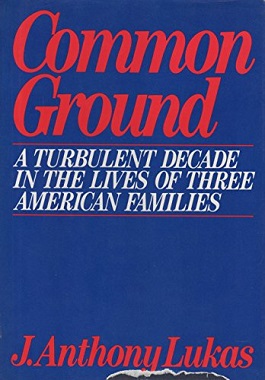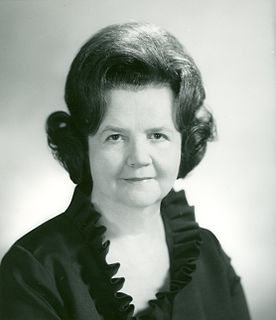
Anna Louise Day Hicks was an American politician and lawyer from Boston, Massachusetts, best known for her staunch opposition to desegregation in Boston public schools, and especially to court-ordered busing, in the 1960s and 1970s. A longtime member of Boston's school board and city council, she served one term in the United States House of Representatives, succeeding John William McCormack.

Desegregation busing in the United States is the practice of assigning and transporting students to schools within or outside their local school districts in an effort to reduce the racial segregation in schools. While the 1954 U.S. Supreme Court landmark decision in Brown v. Board of Education declared racial segregation in public schools unconstitutional, many American schools continued to remain largely segregated due to housing inequality. In an effort to address the ongoing de facto segregation in schools, the 1971 Supreme Court decision, Swann v. Charlotte-Mecklenburg Board of Education, ruled that the federal courts could use busing as a desegregation tool to achieve racial balance.
Colin Diver was the president of Reed College in Portland, Oregon. He was also the Dean of the University of Pennsylvania Law School from 1989 to 1999.

Kevin Hagan White was an American politician best known as the Mayor of Boston, an office to which he was first elected at the age of 38, and which he held for four terms, amounting to 16 years, from 1968 to 1984. He presided as mayor during racially turbulent years in the late 1960s and 1970s, and the start of desegregation of schools via court-ordered busing of school children in Boston. White won the mayoral office in the 1967 general election in a hard-fought campaign opposing the anti-busing and anti-desegregation Boston School Committee member Louise Day Hicks. He was earlier elected Massachusetts Secretary of the Commonwealth in 1960 at the age of 31, and resigned from that office after his election as Mayor.

Restore Our Alienated Rights (ROAR) was an organization formed in Boston, Massachusetts by Louise Day Hicks in 1974. Opposed to desegregation busing of Boston's public school students, the group protested the federally-mandated order to integrate Boston Public Schools by staging formal, sometimes violent protests. It remained active from 1974 until 1976.
Marvin Bailey Scott is an American politician and university professor in Indianapolis, Indiana. He is a nationally known figure for his involvement in school desegregation cases. Scott ran for political office several times and continues to be politically active.
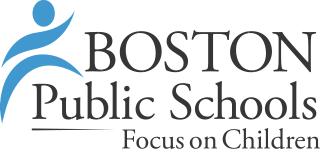
Boston Public Schools (BPS) is a school district serving the city of Boston, Massachusetts, United States.
Wendell Arthur Garrity Jr. was a United States District Judge of the United States District Court for the District of Massachusetts notable for issuing the 1974 order in Morgan v. Hennigan which mandated that Boston schools be desegregated by means of busing.

Hyde Park High School is a defunct four-year public high school that served students in ninth through twelfth grades in the Boston neighborhood of Hyde Park, Massachusetts, United States. The school held its first classes in 1869, one year after the founding of the town of Hyde Park. The school was located at 655 Metropolitan Avenue from 1928 until its closure in 2005.
Morgan v. Hennigan was the case that defined the school busing controversy in Boston, Massachusetts during the 1970s. On March 14, 1972, the Boston chapter of the NAACP filed a class action lawsuit against the Boston School Committee on behalf of 14 black parents and 44 children. Tallulah Morgan headed the list of plaintiffs and James Hennigan then chair of the School Committee, was listed as the main defendant.
The desegregation of Boston public schools (1974–1988) was a period in which the Boston Public Schools were under court control to desegregate through a system of busing students. The call for desegregation and the first years of its implementation led to a series of racial protests and riots that brought national attention, particularly from 1974 to 1976. In response to the Massachusetts legislature's enactment of the 1965 Racial Imbalance Act, which ordered the state's public schools to desegregate, W. Arthur Garrity Jr. of the United States District Court for the District of Massachusetts laid out a plan for compulsory busing of students between predominantly white and black areas of the city. The hard control of the desegregation plan lasted for over a decade. It influenced Boston politics and contributed to demographic shifts of Boston's school-age population, leading to a decline of public-school enrollment and white flight to the suburbs. Full control of the desegregation plan was transferred to the Boston School Committee in 1988; in 2013 the busing system was replaced by one with dramatically reduced busing.
John J. Kerrigan (1932-1996) was a member of the Boston School Committee from 1968 to 1975, and a member of the City Council from 1975 to 1977. He was one of the leading opponents of the plan to integrate the Boston Public School through busing.
South Boston High School was a public high school located in South Boston, Massachusetts, United States. It was part of Boston Public Schools.
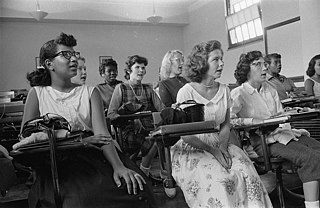
School integration in the United States is the process of ending race-based segregation within American public and private schools. Racial segregation in schools existed throughout most of American history and remains an issue in contemporary education. During the Civil Rights Movement school integration became a priority, but since then de facto segregation has again become prevalent.
Robert A. Dentler was an American sociologist who co-authored and oversaw the controversial court-ordered busing plan to desegregate Boston's public schools in the 1970s through the 1980s. He was involved in the school desegregation plans for at least sixteen other northern American cities and the University of North Carolina system.
Jean McGuire was the first female African American to gain a seat on the Boston School Committee at Large, in 1981 during the Boston busing desegregation era. She also served as the executive director of the Metropolitan Council for Educational Opportunity since 1973. She grew up in Massachusetts and lived in Washington, D.C. during the 1930s and 1940s, when schools were mostly segregated and unequal.
From 1974 to 1976, the court-ordered busing of students to achieve school desegregation led to sporadic outbreaks of violence in Boston's schools and in the city's largely segregated neighborhoods. Although Boston was by no means the only American city to undertake a plan of school desegregation, the forced busing of students from some of the city's most impoverished and racially segregated neighborhoods led to an unprecedented level of violence and turmoil in the city's streets and classrooms and made national headlines.
Until 1950, African Americans were a small but historically important minority in Boston, where the population was majority white. Since then, Boston's demographics have changed due to factors such as immigration, white flight, and gentrification. According to census information for 2010–2014, an estimated 180,657 people in Boston are Black/African American, either alone or in combination with another race. Despite being in the minority, and despite having faced housing, educational, and other discrimination, African Americans in Boston have made significant contributions in the arts, politics, and business since colonial times.
Tallulah Morgan was the main plaintiff in the historical case Morgan v. Hennigan, which led to the desegregation of the Boston school system in the 1970s.
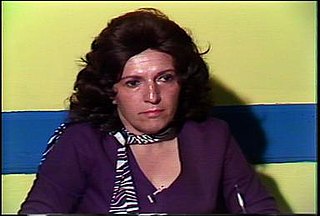
Elvira "Pixie" Palladino was an American politician from Boston, Massachusetts, best known for her affiliation with Restore Our Alienated Rights (ROAR) and her opposition to court-ordered busing in the 1960s and 1970s. She was elected to the Boston School Committee several times in the 1970s, and served three two-year terms. Though she was cleared of bribery charges related to the Boston School Committee in 1981 this ultimately led to the loss of her Committee seat.
